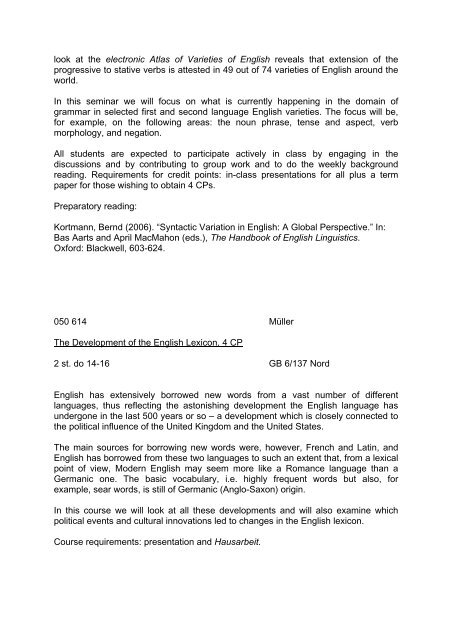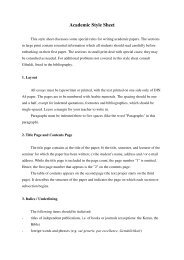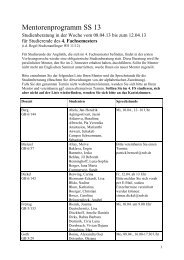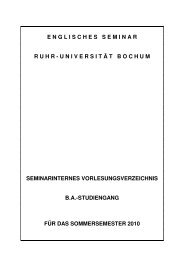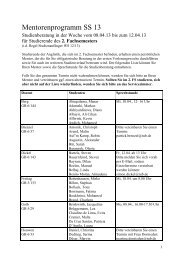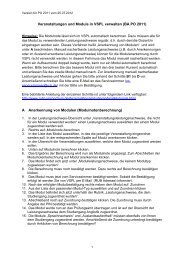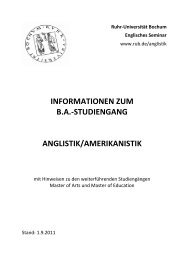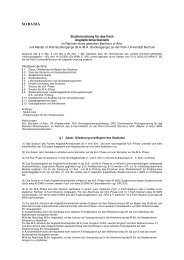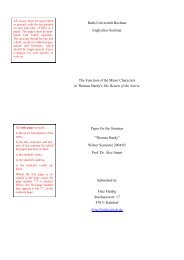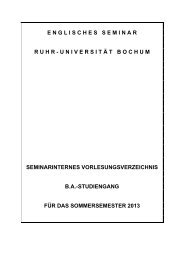universit ä tbochum seminarinternes vorlesungsverzeichnis ba-st
universit ä tbochum seminarinternes vorlesungsverzeichnis ba-st
universit ä tbochum seminarinternes vorlesungsverzeichnis ba-st
You also want an ePaper? Increase the reach of your titles
YUMPU automatically turns print PDFs into web optimized ePapers that Google loves.
look at the electronic Atlas of Varieties of English reveals that extension of the<br />
progressive to <strong>st</strong>ative verbs is atte<strong>st</strong>ed in 49 out of 74 varieties of English around the<br />
world.<br />
In this seminar we will focus on what is currently happening in the domain of<br />
grammar in selected fir<strong>st</strong> and second language English varieties. The focus will be,<br />
for example, on the following areas: the noun phrase, tense and aspect, verb<br />
morphology, and negation.<br />
All <strong>st</strong>udents are expected to participate actively in class by engaging in the<br />
discussions and by contributing to group work and to do the weekly <<strong>st</strong>rong>ba</<strong>st</strong>rong>ckground<br />
reading. Requirements for credit points: in-class presentations for all plus a term<br />
paper for those wishing to obtain 4 CPs.<br />
Preparatory reading:<br />
Kortmann, Bernd (2006). “Syntactic Variation in English: A Glo<<strong>st</strong>rong>ba</<strong>st</strong>rong>l Perspective.” In:<br />
Bas Aarts and April MacMahon (eds.), The Handbook of English Lingui<strong>st</strong>ics.<br />
Oxford: Blackwell, 603-624.<br />
050 614 Müller<br />
The Development of the English Lexicon, 4 CP<br />
2 <strong>st</strong>. do 14-16 GB 6/137 Nord<br />
English has extensively borrowed new words from a va<strong>st</strong> number of different<br />
languages, thus reflecting the a<strong>st</strong>onishing development the English language has<br />
undergone in the la<strong>st</strong> 500 years or so – a development which is closely connected to<br />
the political influence of the United Kingdom and the United States.<br />
The main sources for borrowing new words were, however, French and Latin, and<br />
English has borrowed from these two languages to such an extent that, from a lexical<br />
point of view, Modern English may seem more like a Romance language than a<br />
Germanic one. The <<strong>st</strong>rong>ba</<strong>st</strong>rong>sic vocabulary, i.e. highly frequent words but also, for<br />
example, sear words, is <strong>st</strong>ill of Germanic (Anglo-Saxon) origin.<br />
In this course we will look at all these developments and will also examine which<br />
political events and cultural innovations led to changes in the English lexicon.<br />
Course requirements: presentation and Hausarbeit.


